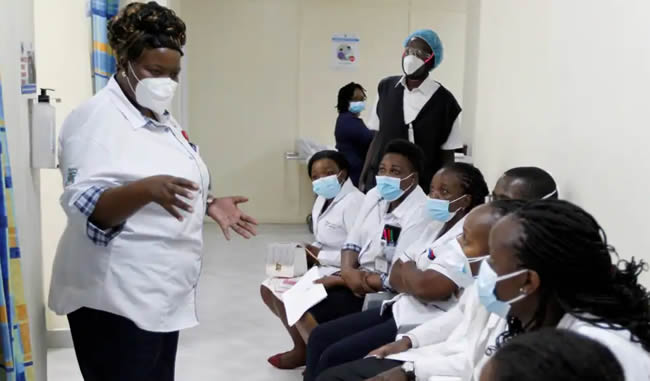
As cases of COVID-19 caused by the omicron variant soar in South Africa, hospital officials monitoring the outbreak say patient reports offer compelling evidence the variant causes illness that is less severe than previous forms of the disease.
“Most of the people we’re seeing are having mild or moderate form of COVID-19, and not the severe form that requires hospitalization and may lead to death,” said Dr. Richard Friedland, the chief executive of Netcare, one of South Africa’s largest private hospital groups, based in Johannesburg.
“Patients present with mild to moderate flu-like symptoms, a scratchy or sore throat, a headache, or a runny or blocked nose,” he said.
Similar symptoms are being reported nationwide as hospitals monitor patients.
World health authorities caution that the patient information is preliminary, and they say it is not known how omicron will behave as it spreads more widely.
The World Health Organization says the variant has been found in more than 50 countries. Anecdotal information from countries including the United States so far indicates less severe symptoms than exhibited in previous variants, echoing findings in South Africa hospitals.
“We certainly have information from South Africa that many of the patients that are identified with omicron have a milder course of disease, but it does take time for people to go through the full course of their infection,” said Maria Van Kerkhove, WHO’s technical lead for COVID-19.
South Africa’s National Institute for Communicable Diseases reported 20,000 new COVID-19 cases and 36 COVID-19 related deaths Wednesday, the highest numbers since the omicron variant was first detected.
NetCare’s Dr. Friedland said the company’s hospitals are seeing far fewer admissions, however, than in the nation’s earlier phases of COVID-19 and most patients are not suffering enough to need oxygen.
“Ninety percent of the patients we have in the hospital now need no oxygen at all,” he said. “They’re on room air. All they have is mild upper respiratory tract infections.
“So, it’s a very, very different clinical picture,” he said. “That contrasts to 100% of patients that we admitted during the first, the second and the third wave, who were very sick, and all required oxygen therapy.”
Most omicron-positive people in NetCare’s hospitals are what Friedland called “incidental” COVID-19 patients, who come to the hospital because of other emergencies, or to have a surgical procedure, and are subsequently diagnosed with coronavirus.
Roughly 75% of people in NetCare hospitals diagnosed with COVID-19 are unvaccinated, Dr. Friedland said. He added that patient admission data appears to be “clear evidence” that current vaccines offer some protection against omicron.
Some 36% of South Africans are fully vaccinated and the government is strongly urging citizens to get the shots.
Some information in this report came from Reuters.
Source: voanews.com























